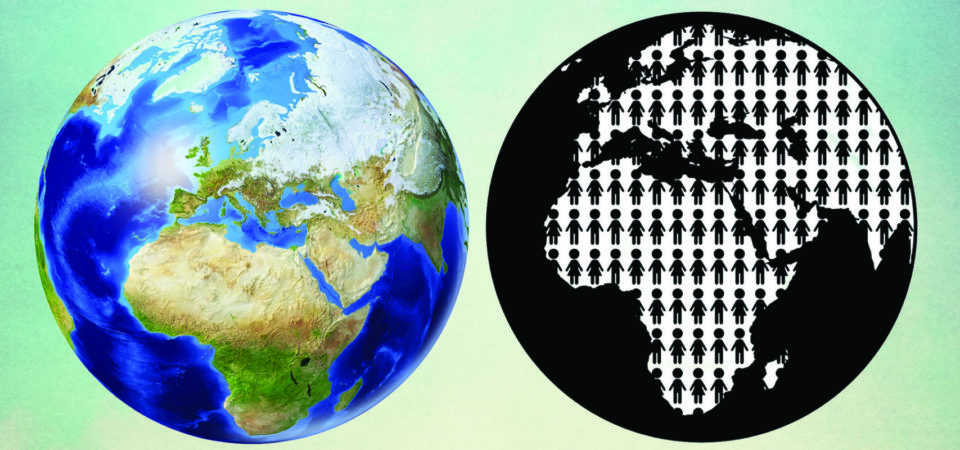“I conceive that pleasures are to be avoided if greater pains be the consequence.” – Michel de Montaigne
Life has intrigued me since I was a kid. After years of studying, researching, and teaching, I have come to appreciate the inevitable links amongst science, ecology, technology, economy, and our societies. In this unconventional book, I share with you how we, humans, have ignored/misinterpreted these connections in the past few millennia and as a result have lost touch with science and the way our natural world is organized and sustained for billions of years.
As I was studying towards my degrees in biochemistry and biology, I began to notice the common themes occurring amongst the levels of organization in nature – Subatomic Particles, Atoms, Molecules, Macromolecules, Cell Parts/(Organelles), Cells, (Tissues, Organs, Systems), Organisms, Populations, Communities, Ecosystems, Biomes, Biosphere – particularly within the biotic components. We must apply the same themes to our communities. The rule book provided by our generous and gracious host, Mother Nature, contains the survival strategies that ensure the well-being of all participants at various levels of organization.
At the molecular level, I have been fascinated by the complexities of the organic reactions in the cell but the chemist in me always doubted the notion of “emergent properties” since the putative (regulatory) processes that define life clearly span all levels.
In my decades of teaching, while trying to portray a simplified version of the most complex machine, the cell – the basic unit of life – surprisingly, many significant themes of life, would readily surface. The prominent themes such as spatiotemporal compartmentalization, simplicity in complexity, unity-diversity, structure-function, nature-nurture, and dormancy govern not only the events at the cellular but at multiple levels of organization.
The cell theory hence must have an added statement declaring the cell as the basic unit of the biosphere. The objective of our existence must then be to fight to protect this most sacred and complex entity in the universe. The preservation of the basic unit of us and the biosphere equate to the preservation of Mother Nature and is the ultimate duty of all intelligent beings.
These same scientific principles must hence be applied to our (not so) complex social systems and networks. Science education is indeed the only way humans can come to appreciate the intricacies of life and embrace sustainable living through acknowledging the laws of ecology.
As a scientist/educator, I am obligated to put forth this comprehensive scientific ideology that widens the aperture so we can have a larger perspective. In this context, we understand why and how systemic and transformative changes must happen not only to individuals or organizations but to the foundations of our civilizational systems.
A parallel, unifying, global curriculum, for instance, must inform and nurture (future) citizens to work collaboratively and innovate to reconstruct the resilient, sustained communities of tomorrow, capable of coexistence with all living things on our planet.
It is not surprising that small-scale farmers that practice agriculture – being linked to natural ecosystems by cutting down their use of synthetic fertilizers and pesticides – end up experiencing less soil degradation, waste less water and resources, pollute less, and are ultimately more profitable, biodiverse, and sustainable.
Environmental movements have effectively been smothered or greenwashed in the past few decades as we have continued to treat anthropogenic (man-made) crises, such as climate change as the cause, not a symptom, of our socio-economic failures.
Current environmentalism lacks the necessary scientific foundation to be regarded as a credible movement. Moreover, true (hard) scientists lack the necessary biological background to lay out a unifying ideology that links thermodynamics to life. Erwin Schrodinger surprisingly attempted it.
Here, I share a new perspective on life on our planet. The incredibly complex regulatory processes that ultimately drive the process of natural selection on our (or any life-harboring) planet are indeed dictated by thermodynamic laws. Molecular Ecology, a multidisciplinary, overarching ideology allows for the integration of our observations to illustrate why and how we should get from where we are to where we must be.
Anthropocentricity or anthropocentrism, referring to the notion that humans are the most important entity in the universe is the obsolete and unscientific belief – even more regressive than geocentricism – as it encompasses nationalism, racism, and sexism. In addition, this acquired narcissistic behavior is clearly responsible for our exponentially increasing ecological footprint.
The cost of this book intends to initiate fundraising towards my goal of setting up an international, non-profit venture that promotes molecular ecoliteracy and invests in other ecological footprint reduction initiatives.
Let’s call upon the United Nations, the World Bank, and the International Monetary Fund to provide leadership in addressing our crises at a global scale, and propel corporations and governments towards sustenance.
How likely would it be for our existing multilateral/international governing bodies to collaborate and truly address our compounding global challenges?
And finally, a call upon the individuals that bear the biggest responsibility of becoming educated to educate, cut down on their footprint-contributing activities to paralyze the mega-corporations of destruction, and demand change.
In this book, I discuss the scientific processes that have driven and sustained life for billions of years. This is a bird’s eye view of the way our planet has worked and the way our actions are dismantling it. Who I think my target audience should be, you ask. I think every living human being on this planet who can read and whose ecological footprint is not zero should consider reading this book and check the “Show Me” lectures for further clarification.
A unified (scientific) community’s contributions to better defining and quantifying the causes of crises will help us warn policymakers about them.
Science calls for us to recognize interdependence at all levels. I am hoping this book would serve as a manifesto to help humanity figure out how cooperation within and across various communities, from families to international institutions, can guide us towards sustenance.
 Farid Pourkhatai has been an IB Chemistry/Biology Teacher at Victoria Park Collegiate Institute in Toronto, Canada for the past few decades. His passion for teaching environmental sciences has prompted him to write a book titled ”The Alienated Planet”, published in September 2021, and to present “Molecular Ecoliteracy” at the “Moving Forward Together” symposium of the Science Teacher Association of Ontario in November 2021. His presentation slides and other material can be accessed here.
Farid Pourkhatai has been an IB Chemistry/Biology Teacher at Victoria Park Collegiate Institute in Toronto, Canada for the past few decades. His passion for teaching environmental sciences has prompted him to write a book titled ”The Alienated Planet”, published in September 2021, and to present “Molecular Ecoliteracy” at the “Moving Forward Together” symposium of the Science Teacher Association of Ontario in November 2021. His presentation slides and other material can be accessed here.
Farid’s novel ideas and approaches in teaching ecology and promoting Sustainable Development Goals have been recognized by the Global Compact Network of Canada in November 2020.
The MAHB Blog is a venture of the Millennium Alliance for Humanity and the Biosphere. Questions should be directed to joan@mahbonline.org
The views and opinions expressed through the MAHB Website are those of the contributing authors and do not necessarily reflect an official position of the MAHB. The MAHB aims to share a range of perspectives and welcomes the discussions that they prompt.

